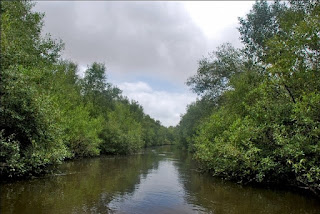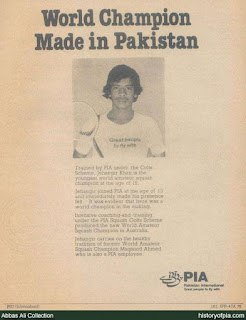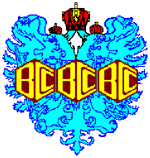MERRY MEADOWS - Chapter 13 - Cerebral Fillip
Of the many TCS characters, colorful or otherwise, that it has
been my privilege and pleasure to make the acquaintance of, let me start with
JJ, Jamil Janjua, who is readying himself for open heart surgery in Dubai as I
write this, and I wish him a speedy recover to his former hale and hearty self,
ameen.
(ED –
Since I last wrote, JJ has experienced a successful surgery, is out of the ICU
and back in his room, and engaging with his physiotherapist, Allah be thanked).
JJ is a high flyer, and once captained the old warhorse of the aviation
industry, the Boeing 707, before being grounded on medical grounds from PIA. He
formed the first interesting twist that I noticed at TCS. As captain of an
airliner, JJ was the commander of his airship, and in that capacity could even
solemnize marriages.
For a flyer there can be nothing worse than being grounded, and
contemplate in midlife a brand new career away from the deep blue skies. After
an adjustment period that I am sure took its emotional toll, and he was ready
to engage with active life once more, JJ’s cockpit association with flight
engineer-turned-entrepreneur Khalid Awan came to his rescue, and JJ found
himself in the manager operations job at TCS in May 1986 helping engineer his erstwhile engineer’s ship even as
his erstwhile engineer occupied the captain’s seat. JJ’s
rise back to the captain’s seat would happen over a decade and a half later,
but not before the TCS ship had sailed through some fairly severe turbulence.
Cool
Hand Luke
For some reason JJ has always reminded me of a Greek tycoon, his
short stature and very Mediterranean features, adorned with a trimmed beard and
moustache, present a package at once dignified and dashing, exuding a calmness
and tranquility born of meditation and the practice of yoga. Now that I come to
think of it, I have never seen JJ lose his cool in the 12 years that I have
known him. He could just as easily have passed for Napoleon Bonaparte, except
Bonaparte didn’t have a beard and was taken to encasing his right hand in his
coat between the second and third buttons. I have never seen JJ do that either.
There’s another aspect to JJ that bears mentioning. I have always
seen him use ‘jj’ in lower caps. While this may run contrary to established
written communication norms, it is born of both humility at a personal level,
and deference to the living legend Javed Jabbar, who also goes by the
initials JJ. Begging Jamil Janjua’s pardon at both a personal and professional
level, I am taking the liberty of using the capital letters JJ to denote him,
knowing full well that the elder JJ, Javed Jabbar, would have no objections.
JJ couldn’t hack Naveed Awan’s stewardship of TCS, and having
risen to the chief operating officer’s position over a ten years span, JJ left
TCS in 1996 and took up a job with the British Council engaging in youth
development, with a special focus on public speaking, and running the Hyde Park
Juniors program. In the post Naveed Awan period JJ was recruited back into TCS in
May 2001 and assigned the COO’s mandate.
What struck me as poetic irony was the role reversal. JJ was now
co-piloting a ship with his former flight engineer in the captain’s chair. JJ
didn’t seem to have any problems with that, and having Saqib Hamdani as his
director operations, a competent team was formed that permitted the captain to
catch a snooze midflight, and enjoy the fruits of professional management.
JJ had always been a strong proponent of human resource
development, and once he was back at TCS he took hold of the company’s public
relations effort and gave it a cerebral fillip when it came time to celebrate
the second decade of TCS’s existence in 2003. My own recruitment into TCS was
part of this cerebral fillip, and in focus was the customer newsletter that he
had started in the early 1990s, the TCS CONNECT. It was an 8 pages affair
comprising company news, and published bi-monthly. I was to contribute one
report every issue.
The TCS head office was located in the Nursery area on Karachi’s
Shahrah-e-Faisal in what had once been a large residential accommodation
converted into a fairly spacious office. Housing about 30 people, the
couriers sorting area, the nerve center of the operation, was situated in an adjacent
premise. An interesting feature of the TCS head office was the large bronze
bell prominently placed near the entrance. Any employee having a grievance or
some good news to share could ring that bell out loud, and members of
management and others in the vicinity would gather to hear the grievance and
seek its resolution or share in the joy of accomplishment which was mostly the
case.
A bit dramatic in line with the Mughal tradition of
Adl-e-Jahangiri, but it served its purpose. TCS had remained a union-less
organization through a very tumultuous period of Pakistan’s history, and the
credit for this was given to a fair and open ownership driven by the best
interests of its employees. The bell somehow went missing when the head office
relocated to its present coordinates at the Karachi Airport, but by then TCS
had evolved, with multiple channels open to staff to make known their issues
and successes, and a proactive management that stayed ahead of the curve in the
resolution of those issues and celebration of the successes.
For the twentieth anniversary celebrations JJ had prepared a
special menu, a veritable feast for thought, as it were, with high teas that
did justice to the physical appetite for food that built up during the
extremely thought provoking proceedings. Based on the principle that 20 percent
of the customers in any business generate 80 percent of the revenue, JJ had
drawn up a ‘hit list’ of the top TCS corporate customers whose top managements
were invited, at regular intervals right through 2003, to the Royal Rodale Club
on Khayaban-e-Sehar, a stone’s throw from the shores of the Arabian Sea. Here
the leading minds of the time regaled the gathered with facts and philosophies
culled from the four corners of the globe that further grew the already
formidable minds in attendance.
The
New Order Unfurls
JJ’s stint at the British Council had lit a major bulb in his
head, and evidence of this lies in the inaugural issue of the resurrected TCS
CONNECT (Issue #1 Volume #1, July-August, 2001) that he initiated upon his
second tour of duty with TCS. Next to the Chief Operating Officer’s Message is
an announcement about the visit to Pakistan of the legendary management guru
Tom Peters for a seminar and workshop. That announcement, titled ‘Tom Peters’
Seminar’, was an early indicator of the new management style in vogue at TCS.
Some part of that announcement’s text introducing Tom Peters bears
reproduction.
“He describes himself as a prince of disorder, champion of bold
failures, maestro of zest, professional loudmouth, corporate cheer leader,
lover of markets, capitalist pig…. You get the picture. He has even been
featured in the cartoon strip ‘Dilbert’ as a ‘spitter’ when speaking in public.
The Economist has tagged him as an Uber-Guru (super guru), while his
unconventional views have led Business Week to describe him as business’s ‘best
friend and worst nightmare’.”
In the very first issue of the newsletter TCS CONNECT JJ defined
the new order for those who were paying attention, and right through the year of
the 20th anniversary celebrations the Royal Rodale Club played host
to some scintillating events, raising the curtain on Omar Khan, and bringing to
Pakistan on his very first visit Professor Dr. Edward de Bono, the father of
lateral thinking. Many years later we would also play host to the father of
radiant thinking, Tony Buzan, as well as the father of thinking about thinking, Peter Senge..
In 2001, unbeknownst to JJ, the Octara germ had already been
planted in his brain where it would ‘fester’ and grow in the glow of public
adulation, and in a few short years turn into a thriving, standalone business
enterprise, and act alongside as a major relationship builder for the TCS
brand. Human resource development was the name of the game if Pakistan was to
break out of its vicious cycle of poverty and debt. Corporate leadership at all
levels of the management hierarchy, whether in the private or public sectors,
had to be brought up to speed, and induced and seduced into leaving the box
within which most of us were very tightly packed.
Daydreaming
Mangroves
Writing for TCS CONNECT put me through a crash course on how the
human brain could be right sized and its many short circuits repaired to yield
a world full of win-win outcomes that would make humanity a sight for sore
eyes. It was wonderful! It fed my afterburners with the kind of fuel that kept
them burning inexhaustibly. The beauty of it was that it did not take up any
time or energy, aligned as it was with what I’d rather have been doing. It
allowed me all the space that I needed to chase up issues in the public domain
that I was passionate about, and in the year 2003 the environment bug had
bitten me in a big way with mangroves on my mind. I had expended considerable
time and energy connecting the dots and bringing together various stakeholders
onto a common platform. The conservation of Nature was in the public interest,
and therefore of interest to TCS, I successfully pointed out to the TCS
management.
There was a lot of good work being done by the IUCN and WWF, as
also the Sindh Wildlife Department, and the WWF’s Wetland Center, situated in
the midst of a thick mangroves forest in the Sandspit backwaters, was a major
development that unfortunately through uninspired management had by and large
failed in mobilizing ecotourism, and fallen a long way short in creating
awareness amongst the multitudes of Karachi about the great benefits to human
life of this marine jungle.
To its credit the WWF did have a coaster service that ferried the
occasional groups to and from the Wetland Center, but which somehow failed to
transform into a scheduled shuttle service. The massive concrete structure at
Sandspit was clearly at odds with the natural mangroves environment within
which it was situated, but it had multimedia facilities as well as some
informative maps and other displays that educated the visitors on their marine
environment. But it was in no way close to the effort that needed mounting
considering the scale of deforestation and land reclamation that was taking
place, posing a clear and present danger to the survival of the mangroves.
My friend and squash mate of old, Azir Mumtaz, a dashing officer
in the Pakistan Navy, had enabled for me a meeting with his former boss, a rear
admiral posted in a senior position at the Karachi Port Trust, the ranking
landlord and trustee of Karachi’s coastal belt. The patch that had caught my
attention was the fast fading mangrove jungle in Chinna Creek right in the
center of Karachi, as it were, and not a one hour’s drive away as in the case
of the WWF Wetland Center. Here I wanted to see erected a skywalk on bamboo
stilts that snaked its way through the mangrove treetops, making for an
undulating aerial walking track interspersed with bird watching platforms. The Chinna
Creek area was just waiting to be transformed into a marine wildlife sanctuary,
and I was all set to mobilize eco-tours, and make a little cash alongside fighting
the good fight championing mother nature.
Along the Chinna Creek were situated the Beach Luxury Hotel, the
Boat Club, the Naval Officers Residential Estate or NORE-1, and further up
there was the Boating Basin with its food strip of restaurants, the largest in
the country by some accounts, that attracted thousands of people and their
families from all over the city. The Chinna Creek mangroves skywalk could make
ecotourism a profitable reality, and offer a platform where the citizenry of
Karachi could experience Nature right in the middle of town.
To Azir’s credit I have to admit that he is one of the very few people
I know who can comprehend my drift, no matter how outlandish or farfetched it
might appear to the average and often above average minds. Our problem in
Pakistan has been that any project not driven by dollars and cents short term
profitability is consigned to the dust bin without a second thought. Azir’s
boss, the admiral, was possessed with an equally keen eye for projects that tread
off the beaten path, and he immediately understood what I was driving at. Thank
God for naval officers imbued with the bigger picture.
I have been often reprimanded by friends and family for making my own
life unnecessarily difficult. Had I requested the KPT for a mobilization
advance I am sure it would have been forthcoming. But the whole idea was independently
generating awareness along with a cash flow that would meet operational needs,
and not as an adjunct of KPT. This I was sure I could manage from the powerful
stakeholders that lined the banks of Chinna Creek and needed sensitization on
the issue of mangroves conservation and promotion. From the KPT all I needed
was permission to operate in its domain, and this was readily forthcoming. The
admiral recognized a good PR project when he saw one.
Fiasco
But a PR project is only of any use once the organization has been
fulfilling its core responsibilities. The KPT was under public pressure for
having cleared a large tract of mangrove forest for the development of its
officers housing society, and this had drastically reduced the size of the
Chinna Creek backwaters, and with it compromised the natural de-silting of the
Karachi Harbour that the daily tidal ebb and flow ensured. The KPT had taken
its eyes off the ball, and the silt had begun accumulating, rendering depth
charts outdated.
On the 13th of August, 2003 the TCS 20th
anniversary celebrations were in full flow at the Royal Rodale Club, with
Allama Iqbal’s grandson Azad occupying center-stage with his harmonium, singing
in a voice most melodious verses from his grandfather’s collection, in
commemoration of Pakistan’s Independence Day. Suddenly the air-conditioning of
the Royal Rodale auditorium was overwhelmed by a foul and suffocating stench of
diesel, bringing proceedings to an abrupt close and sending to the auditorium’s
exits a clearly panicked gathering of Pakistan’s corporate elite.
On July 28, 2003 The Tasman Spirit, a Greek registered oil tanker, had run aground while
approaching Karachi Harbour. For a while there it had held its ground even as
crisis managers scrambled to retrieve the situation. But the Monsoon winds made
for very rough seas, and when over two weeks later the crisis remained unresolved,
the Tasman Spirit keeled over and broke up, emptying its guts into the sea.
Over 12,000 tons of oil got spilled into the Arabian Sea polluting, according
to the IUCN, 16 kilometers of pristine
coastline.
Adding insult to injury, the ship's insurer offered
10 million rupees (about $180,000 in 2003) in compensation to the Karachi port
authorities, and agreed to pay all cleaning expenses. What a cruel joke and a
half. Understandably, the Chinna Creek mangroves skywalk went completely off
the KPT’s radar, and I was too embarrassed and angry to approach the admiral
for any follow up. Such are the trials and tribulations of entrepreneurs who
seek to go off the beaten path.
Merry Meadows - Memoirs of an entrepreneur
Merry Meadows - Memoirs of an entrepreneur





Comments
Post a Comment